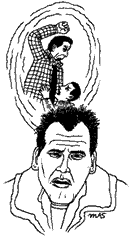
Movies
Affliction (Lion's Gate Films). Nick Nolte's outstanding acting and Paul Schrader's masterful directing earn this film uniformly high marks from critics. As a tragically repressed and alcoholic small-town cop, Nolte conveys a "fierce, anguished intensity" (Janet Maslin, the New York Times). Critics say Schrader's style is a perfect match for Russell Banks' novel, and that the director "has hit, in this exquisitely shaped, paced, painted, and edited production, a new, deep level of artistry" (Lisa Schwarzbaum, Entertainment Weekly). Only complaint: The voice-over narration by Willem Dafoe (as Nolte's brother) is a bit stilted and portentous. (Read this interview with Banks by Pinckney Benedict, and click here for David Edelstein's review in Slate.)
Hilary and Jackie (October Films). Based on the life of phenomenal British cellist Jacqueline du Pré, as remembered by her sister, this film has the critics split. Anand Tucker's film is often unflattering to the late musician, and some reviewers mark it as the work of a jealous sibling out to tarnish her sister's hallowed image. Gwendolyn Freed's outraged review in the Wall Street Journal attempts to refute many of the film's claims and says it "paints a repulsive portrait of du Pré." Others rave, calling it "a compelling look at the most intimate and troubling of family dynamics" (Kenneth Turan, the Los Angeles Times), with a stellar performance by Emily Watson as Jackie. As Jack Mathews writes in Newsday, the film is "superb," and "accurate or not, it makes a great story." (Visit the official site.)
The Hi-Lo Country (Gramercy Pictures). The "chaps and Stetsons here prove an ill fit" (Peter Rainer, New York) for British director Stephen Frears (Dangerous Liaisons) as he tries his hand at a 1940s western. Woody Harrelson is "spectacularly kinetic" (Stephen Holden, the New York Times) as a ne'er-do-well cowboy, but the rest of the film drags. Billy Crudup (as Harrelson's best friend and business partner) is stiff, and Patricia Arquette, playing the object of both their desires, fails to generate the heat her temptress-extraordinaire part requires. Dennis Lim of the Village Voice calls it a "perfunctory, often dreary love-triangle melodrama." (Visit "Groveling At The Feet Of A Goddess," a "Patricia Arquette Shrine," and check out Edelstein's pan in Slate.)

Books
The Haunted Wood: Soviet Espionage in America--The Stalin Era, by Allen Weinstein and Alexander Vassiliev (Random House). Reviewers praise this exposé based on reams of declassified KGB documents detailing Soviet espionage in the United States from the 1930s to the early '50s. Critics say reading it is "rather like looking into the new edition of a book from which half the pages had previously been torn out" (Joseph F. Perisco, the New York Times Book Review). Controversial figures such as Alger Hiss, the Rosenbergs, and others thought by many to be the victims of the Red hunts of the '40s and '50s are confirmed as spies. "The importance of this book cannot be overstated" (Arnold Beichman, the Washington Times). (Buy the book at Amazon.com.)
Note Found in a Bottle: My Life as a Drinker, by Susan Cheever (Simon & Schuster). John Cheever's daughter takes a beating: Jonathan Yardley says Susan Cheever's memoir of her struggles with alcohol is "Grade B literary/journalistic opportunism-cum-sensationalism" (the Washington Post). Alex Beam goes further in the Boston Globe, calling it a "despicable, wooden memoir." The "inescapable conclusion of Note," he continues, "is that Cheever is a horrible person, engorged with self-regard, who has been masticating the corpse of her dead, successful father for fun and profit." A few pipe up to defend her: Publishers Weekly calls it "a powerful story written in precise, emotionally intense prose." (Read this interview with Cheever in the New York Times [requires free registration], in which she responds to Yardley's comments in the Post: "That's just what he did to Daddy.")
Glamorama, by Bret Easton Ellis (Knopf). Ellis' latest novel of ennui and anomie among America's beautiful people irritates reviewers to varying degrees. Michiko Kakutani is dismissive in the New York Times, calling it a "glutinous hodgepodge of a book ... a lugubrious, repetitious tale." While never resorting to praise, The New Yorker's Alex Ross concedes that it may be Ellis' most fully realized novel since The Rules of Attraction and describes the prose style as "mysteriously elegant." The most apt description of Ellis' achievement comes from Rhonda Lieberman in the Village Voice, who says that in this portrait of "post-macho," name-dropping, Prada-clad male models, Ellis "captures a cultural moment of radical dandyhood." (Join the Bret Easton Ellis Discussion Forum.)
Recent "Summary Judgment" columns
- Movie--A Civil Action;
- Movie--The Thin Red Line;
- Movie--Down in theDelta;
- Movie--Hurlyburly;
- Movie--Theory of Flight;
- Book--Careless Love: The Unmaking of Elvis Presley, by Peter Guralnick;
- Book--The Jew of New York, by Ben Katchor.
- Movie--Patch Adams;
- Movie--The Faculty;
- Movie--Stepmom;
- Movie--Mighty Joe Young;
- Book--Hundred Dollar Holiday, by Bill McKibben;
- Book--The Vintner's Luck, by Elizabeth Knox.
- Movie--The Prince of Egypt;
- Movie--You've Got Mail;
- Movie--The General;
- Book--Blind Man's Bluff: The Untold Story of American Submarine Espionage, by Sherry Sontag and Christopher Drew, with Annette Lawrence Drew;
- Book--Opened Ground: Selected Poems, 1966-1996, by Seamus Heaney;
- Book--The Unknown Matisse: A Life of Henri Matisse, The Early Years, 1869-1908, by Hilary Spurling.
- Movie--Shakespeare in Love;
- Movie--Star Trek: Insurrection;
- Movie--Rushmore;
- Movie--A Simple Plan;
- Movie--Jack Frost;
- Television--The Tempest (NBC);
- Theater--The Blue Room, by David Hare (Cort Theatre, New York City).